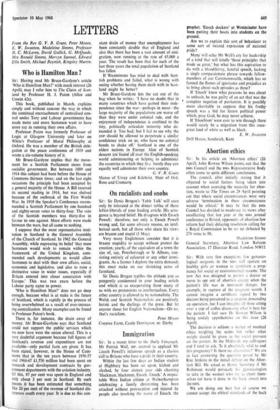Who is Hamilton Man ?
LETTERS
From the Rev G. V. R. Grant, Peter Moore, E. W. Swanton, Madeleine Simms, Professor H. C. McLaren, David Gullick, G. McQuade, Mrs Ronald Simms, Mervyn Samuel, Edward Ellis Smith, Michael Reynish, Kingsley Martin.
Sir: Having read Mr Bruce-Gardyne's article Who is Hamilton Man?' with much interest (26 April), may I refer him to The Claim of Scot- land by Professor H. I. Paton (Allen and Unwin 42s).
This book, published in March, explains simply and without rancour the way in which the continual encroachment of centralised con- trol under Tory and Labour governments has made more and more Scotsmen want to have more say in running their own affairs. • • professor Paton was formerly Professor of Logic. at Glasgow University and later on White's Professor of Moral Philosophy._ at Oxford. He was a member of the British dele- gation at the peace conference of 1919 and wrote a six-volume history of it.
Mr Bruce-Gardyne implies that the move- ment for a Scottish Parliament stems from socialist government. But between 1889 and 1914 this subject had been before the House of Commons thirteen times; and on the last eight occasions the principle had been -accepted by a general majority of the House. A Bill received its second reading in 1914, but was shelved because of the outbreak of the First World War. In 1919 the Speaker's Conference recom- mended a Scottish Parliament by one hundred and eighty-seven votes to thirty-four. The vote of the Scottish members was thirty-five in favour to one against. More efforts were made between the wars, but all came to nothing.
I suppose that the most representative insti- tution in Scotland is the General Assembly of the Church of Scotland. In 1962 the General Assent-61y, while expressing its belief 'that most Scotsmen would wish to remain within the framework of the United Kingdom, com- mended such developments as would allow Scotsmen to deal with their own affairs, social, economic and legislative, and also to raise a distinctive voice in wider issues, especially if Britain entered into closer association with Europe.' This was two years before the Labour party c4me to power.
'Who is Hamilton Man?' does not go deep enough, because what is at stake is the future of Scotland, which is rapidly in the process of being overwhelmed as a result of ever-increas- ing centralisation. Many examples can be found in Professor Paton's book.
There is, for instance, the drain away of money. Mr Bruce-Gardyne says that Scotland could not support the public -services which we now have were the union altered. This is a very doubtful argument because full figures of Scotland's revenue and expenditure are not available—only partial facts are given. It has been stated, however, in the Hotise of Com- mons that in the ten years between 1956-57 and 1966-67 £1,550 million had been spell; on research and development contracts by gov- ernment departments with the aviation industry. Of this, 97 per cent was spent in England and only about 3 per cent in Scotland. By such means it has been estimated that something like 20 per cent of the revenue of Scotland dis- appears south every year. It is due to this con-
stant drain of money that unemployment has been constantly double that of England and also that there has been a vast amount of emi- gration, now running at the rate of 45,000 a year. The result has been that for each of the last three years the total population of Scotland has fallen.
If Westminster has tried to deal with Scot- tish problems and failed, what is wrong with seeing whether having them dealt with in Scot- land might be better?
• Mr Bruce-Gardyne lets the cat out of the bag when be writes: 'I have no doubt that in many countries which have gained their inde- pendence since the war—perhaps in most—the large majority of the populations are worse off than they were under colonial rule, and the enjoyment of independence is confined to the tiny, politically articulate minority who de- manded it. Too bad; but I fail to see why the SNP should be allowed to perpetrate a similar confidence trick on Us, who have no colonial bonds to shake off. Scotland is one of the oldest nations in Europe. Men- Scottish descent an foundall covet the English-speakink world administering or helping to administer the countries in which they live. Surely they can equally well administer their own country.
G. V. R. Grant Manse of Urray and Kilchrist, Muir of Ord, Ross and Cromarty






































 Previous page
Previous page